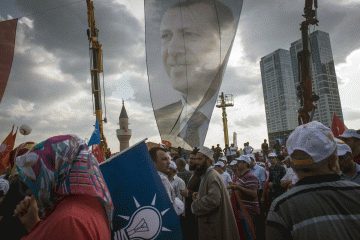Source: Dispatches From The Edge

A rally in support of Prime Minister Recep Tayyip Erdogan's Justice and Development Party in Istanbul's Gezi Park on June 16th
(Image by Monique Jaques / Corbis) Details DMCA
The current corruption crisis zeroing in on Turkish Prime Minister Recep Tayyio Erdogan has all the elements of one of his country's famous soap operas that tens of millions of people all over the Middle East tune in to each day: Bribes, shoe boxes filled with millions in cash, and dark whispers of foreign conspiracies.
As prosecutors began arresting leading government officials and businessmen, the Prime Minister claims that some foreign "ambassadors are engaging in provocative actions," singling out U.S. Ambassador Frank Ricciardone. The international press has largely dismissed Erdogan's charges as a combination of paranoia and desperation, but might the man have a point?
The corruption story is generally being portrayed as a result of a falling out between Erdogan's conservative brand of Islam and the Gulen Community, a more moderate version championed by the Islamic spiritual leader Fethullah Gulen, who currently resides in Pennsylvania. Both are Sunnis. More than a decade ago the two men formed a united front against the Turkish military that eventually drove the generals back to the barracks and elected Erdogan's Islamic Justice and Development Party (AKP) in 2002.
There are differences between the two currents of Turkish political Islam. Erdogan's brand comes out of the "National Outlook" tradition that tends to be suspicious of the West and democracy, cool to wide-open free market capitalism, and more socially conservative. Erdogan has recently told Turkish women how many children they should have -- three -- and railed against abortion, adultery, coed housing, public kissing, and alcohol. The AKP is also closely allied with the Muslim Brotherhood, and Erdogan was a strong supporter of the Brotherhood government in Egypt that was overthrown by a military coup this past July.
In contrast, Gulen's brand of Islam is pro-West, strongly in favor of a free market, and socially flexible. Gulen supporters were active in last summer's demonstrations against Erdogan, although their commitment to democracy is suspect. For instance, Gulen has a more hard-line nationalist approach to the Kurds, Turkey's largest ethnic minority, and only recently began challenging the AKP's authoritarian streak.
Gulen was also critical of Erdogan for breaking relations with Israel following the 2010 Mavi Marmara incident, when Israeli commandos killed eight Turks and a Turkish-American trying to deliver aid to the Palestinians in Gaza. Gulen accused Erdogan of provoking the clash.
The current falling out came to a head when Erdogan proposed closing down one of the Gulen Community's major sources of financing, the "dershanes" or tutorial schools that prepare Turkish students to take exams. The Community has expanded such schools to over 140 countries, including the U.S. The schools also serve as effective recruiting conduits for his movement. The Russians recently closed down the schools, accusing them of being fronts for the U.S. Central Intelligence Agency.
Gulen called the move against the dershanes a "dagger stabbed in our hearts."
But the timing of the corruption investigations suggests this is more about regional politics -- with global ramifications -- than a spat over influential schools and interpretations of Islam.
Erdogan's supporters charge that the investigation is coming from Gulen-dominated prosecutors and judges, and that it is little more than a power play aimed at bringing down the Prime Minister and damaging the AKT on the eve of local elections scheduled for March. "It is clear that I am the real target," Erdogan told the media.
Gulen supporters counter that corruption is widespread, and that the Erdogan government has alienated former allies throughout the region.
There is certainly truth in that charge. From a former policy of "zero problems with the neighbors" Turkey finds itself embroiled in the Syrian civil war, and feuding with Israel, Egypt, Iraq, and Iran. Even what looked like a breakthrough peace accord with the Kurds appears to be turning sour.
But this past fall, the Erdogan government began reversing course and patching up relations with the locals.
Turkey and Iran jointly agreed that there was "no military solution" to the war in Syria, and Ankara expelled Saudi Arabian intelligence agents, who it had accused of aiding the more extremist elements fighting the government of Bashar al-Assad.
Turkey also buried the hatchet with Iraq. Instead of setting up a separate oil and gas deal with the Kurds in Northern Iraq, Ankara has agreed to work through the central government in Baghdad and is pushing to increase cross border trade between the two countries. Of course much of this is practical: Turkey needs energy and Iran and Iraq can provide it more cheaply than anyone else.
These recent policy turnarounds make the timing of the corruption charges suspicious. For two years Erdogan's government has played spear-carrier for the U.S. and its allies in Syria and courted the reactionary Gulf Cooperation Council. The latter consists of Saudi Arabia, Kuwait, The United Arab Emirates, Bahrain, Oman, Qatar, and newcomers Jordan and Morocco.
(Note: You can view every article as one long page if you sign up as an Advocate Member, or higher).





